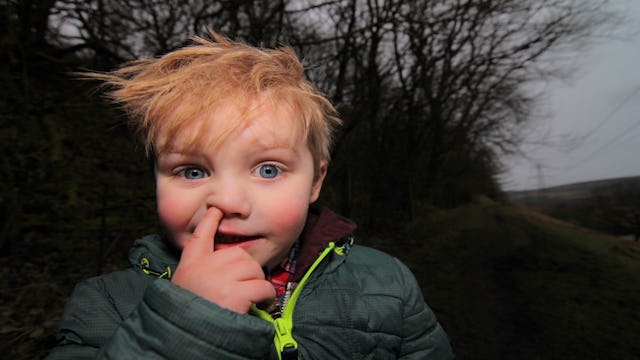Booger And Fart Jokes Can Actually Be Good For Your Child’s Health

I had a pretty difficult time getting my son into reading, which was a tough pill for me to swallow since I love reading so much. It wasn’t until we discovered the dreaded Captain Underpants series with all its poop and fart glory that he began to stay up late in his room, flash light in hand and giggling under the covers, reading a book.
At first, I was completely against those books because they seemed so stupid and fowl. But at the same time, my son was reading, something I hadn’t been able to get him to do no matter how hard I tried. Naturally, Captain Underpants resulted in some low brow turd humor around the house, but it also led to him reading books with fewer fart jokes, like Harry Potter and A Dog’s Purpose. So maybe, just maybe, there is a place for booger and fart jokes, even if they make parents give an epic eye roll.
Dr. Howard Bennett, a pediatrician and author, uses this same strategy, and has been applying booger and fart jokes in his pedantic practice for years. He’s known for bringing up some nasty, childish, Captain Underpants-like topics when meeting with his patients, but according to a recent NPR interview, it all comes with a purpose. “Adults are typically scared about what’s wrong with them,” he said. “Children are scared about what you’re gonna do to them.”
That tension can been relieved when adults and children are able to have a conversation about things that interest them and, naturally, children don’t give a crap about things like politics and the weather. I once tried to chat with my son about the 2016 election when he asked me who Donald Trump was. The moment I began to explain, he drifted off, and when I tried to get his attention back, he made a fart sound with his armpit. Sigh…
Finding a topic to chat about with kids can be challenging. Not all of us are My Little Pony experts, and chatting about Minecraft can feel like discussing a complicated story plot in some strange language (believe me, I’ve tried). And don’t even get me started on YouTube Kids. I have three kids, and I can hardly keep up with all the dumbassery over there.
So rather than try to keep up with all the kid trends, Dr. Bennett tries to reach for the lowest kid denominator — body humor. And just like how my son started to read more because of Captain Underpants, according to Dr. Bennett, he has found that kids are more likely to trust him and take his advice if he begins his meetings with a fart joke.
“In the adult world, research has shown that if you come into my office, and I spend just a minute talking to you about something unrelated to why you’re there, you’ll be more satisfied with the visit, and you’ll be more likely to do what I’m suggesting you do, so it improves patient compliance. It’s not just touchy-feely stuff. It actually has an impact on health care.”
Sometimes, Dr. Bennett’s strategy has backfired, though. He’s had complaints from parents. In fact, some parents even invite him out to lunch so they can give him a lesson on how to appropriately interact with children.
On the flip side, though, he’s had experiences with children in the ER where they were flat out terrified, and by the time he finished connecting with them on a level they understood, he got results like this: “I swear I could have put a tube in the child’s throat, and he would have said ‘Thank you.’ He was mesmerized.”
Dr. Bennett also happens to be an author of kid’s books about the human body. Sure, he talks about all the nastiness that can come from the body, but just like in his visits, he teaches a lot about why it’s all happening. His latest book is The Fantastic Body, and according to Dr. Bennett, “There are a lot of gross books out there, but this was the first time anybody put the body, physiology, medical facts and gross stuff all together.”
I think all of this comes down to using something a little gross to get a child to do something they might be resistant or afraid to do. To be honest, if talking about farts and boogers get’s a child to read a book, that isn’t a bad thing. And if it cuts through the tension some children might feel at the doctor’s office and ultimately helps them be better patients who follow doctors orders willingly, without a parent plugging their child’s nose so they can slide in a spoon full of medicine, that’s ultimately a good thing.
This article was originally published on